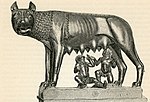Averrunco
Na antiga religião Romana, Averrunco (em latim: Averruncus) ou Aurunco (em latim: Auruncus) é o deus da prevenção de danos. Aulo Gélio diz que ele é um dos deuses potencialmente malignos, que devem pela sua potência de infligir e ou reter o desastre contra pessoas e as colheitas.[1]
Embora a etimologia do nome é muitas vezes ligado ao verbo em latim avertere, "afastar-se,"[2] a mais provável origem está no averro "varrer", daí averrunco, "afastar", Varrão[3] afirma que o infinitivo do verbo averruncare compartilha sua história com o deus, cuja principal função é a prevenção. Averrunco pode estar entre os indigitamenta pertencentes a um outro deus, como Apolo ou Marte,[4][5] [6]Em outras referências, Averrunco também é conhecido como o deus do parto.
Referências[editar | editar código-fonte]
- ↑ Aulus Gellius, Attic Nights 5.12.14: In istis autem diis, quos placari oportet, uti mala a nobis vel a frugibus natis amoliantur, Auruncus quoque habetur.
- ↑ As in the note to Aulus Gellius in the Loeb Classical Library edition.
- ↑ Varro, De lingua latina 7.102.
- ↑ Robert Turcan, The Gods of Ancient Rome (Routledge, 2001, originally published 1998), p. 41 online.
- ↑ William Warde Fowler, The Roman Festivals of the Period of the Republic (London, 1908), p. 89.
- ↑ Matthias Klinghardt, "Prayer Formularies for Public Recitation: Their Use and Function in Ancient Religion," Numen 46 (1999) 1–5; A.A. Barb, "Antaura. The Mermaid and the Devil's Grandmother: A Lecture," Journal of the Warburg and Courtauld Institutes 29 (1966), p. 4; Karen Hartnup, On the Beliefs of the Greeks: Leo Allatios and Popular Orthodoxy (Brill, 2004), pp. 97–101 online (in connection with compelling demons).

